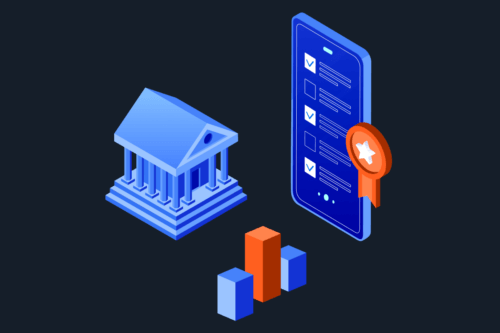
Decentralization is one of the core purposes of cryptocurrency and blockchain technology. Cryptocurrency makes it possible for users to exchange or store value without the need for centralized third parties like a bank. The Bitcoin network, for example, is operated by tens of thousands of distributed nodes (computers) around the world.
While crypto allows users to “be their own bank,” the crypto market is currently driven by cryptocurrency exchanges that utilize centralized custody of user funds in order to facilitate trades. Centralized exchanges account for most crypto trading activity worldwide and perform a critical role in the cryptocurrency market. Decentralized exchanges (DEXs), however, make it possible for users to trade cryptocurrency without giving up control over their assets. DEXs allow users to buy and sell cryptocurrency through self-executing smart contracts that eliminate the need for a central authority.
This piece will explain what a decentralized exchange is and how it works. It will also look at how a DEX differs from a regular exchange, and explore the advantages and disadvantages of both.
What is a decentralized crypto exchange?
A decentralized exchange (DEX) is a peer-to-peer marketplace where users can make direct trades with other users without the need for a third-party intermediary. Their centralized counterparts provide a convenient central place where users can store and trade their crypto with access to a large number of assets and deep liquidity.
DEXs allow users to trade cryptocurrencies directly from their wallets, offering a very high level of control and freedom. Rather than interact with a centralized order book on a custodial cryptocurrency exchange, DEXs allow users to interact directly with smart contracts that execute trades automatically.
A decentralized crypto exchange provides users with the ability to trade on a purely peer-to-peer or peer-to-contract basis without the need for a centralized authority. DEXs utilize automated market makers (AMMs) and liquidity pools in order to facilitate trades in a verifiably decentralized manner.
Key Takeaway
A centralized exchange is like a well-stocked department store with an excellent range of products. Whereas a DEX is more like a marketplace where customers can buy directly from the stall owners and might be able to find unique products that aren’t on offer anywhere else.
Decentralized exchanges vs centralized exchanges
Centralized exchanges and DEXs each offer different features and advantages. Centralized cryptocurrency exchanges perform critical functions within the global cryptocurrency economy. They facilitate large-scale trading (including margin trading), bridging the gap between fiat currency and cryptocurrency. They also provide liquidity and functioning as an entry point into the crypto market for new cryptocurrency users.
Decentralized exchanges take a different approach to cryptocurrency trading. They aim to cut out the middleman. A DEX operates without a centralized authority that facilitates transactions. Instead, DEXs rely solely on trust enforced by code, using smart contracts to match and execute trades.
A user that trades on Swyftx, for example, deposits fiat currency or cryptocurrency into a wallet hosted by the Swyftx platform. Customer funds deposited on Swyftx are then used to trade on the Swyftx exchange platform and then can be withdrawn to an external wallet by the user. Crypto deposited on Swyftx is secured through a range of different security practices that include external penetration testing, third-party security auditing, biometric authentication, two-factor authentication, and more.
Using a DEX, a user must connect their crypto wallet to make trades on the platform. Once the trade is closed, the trading fees are automatically deducted and the crypto assets are added to or subtracted from this wallet.
Did You Know?
A non-custodial wallet is one where you have complete control of your private keys. A custodial wallet reduces personal responsibility but requires trust in the custodian that stores your assets. This custodian is usually a crypto exchange.
How does a decentralized exchange work?
Decentralized crypto exchanges are built on top of blockchain networks, such as Ethereum, that integrate smart contract functionality. In simple terms, DEXs use complex smart contracts that users interact with in order to trade.
Decentralized exchanges can take a variety of different forms. Some exchanges are more decentralized than others. Most DEXs fall into one of three categories: on-chain order books, off-chain order books, and automated market makers.
On-chain order books
DEXs that use on-chain order books, such as 0x or IDEX, operate in a completely decentralized manner, with network nodes on a blockchain dedicated to maintaining order records for an order book that operates on the blockchain. Transactions made on this type of DEX must be confirmed by miners within the network.
Off-chain order books
Decentralized platforms that use off-chain order books, like Stellar DEX, record transactions and execute order book functions in an off-chain environment hosted by a centralized third party. Off-chain order book DEXs are generally considered semi-decentralized due to the presence of centralized authority within their structure.
Automated market makers
Automated market makers (AMMs) are a relatively recent development within the DEX ecosystem. AMMs rely solely on smart contracts to execute trades and do not need order books, leveraging liquidity pools to facilitate instantaneous trades. The Kyber Network is a great example of a decentralized trading platform that uses AMMs.
What are the advantages of decentralized exchanges?
Decentralized exchanges offer a number of advantages to security-conscious cryptocurrency traders or traders that prefer to retain a high level of control over their digital assets.
- Users own private keys. DEX users hold their own private keys and are responsible for managing the security of their assets.
- Greater privacy and anonymity. The decentralized nature of DEXs means that they typically do not implement Know Your Customer (KYC) controls, providing users with the ability to trade cryptocurrency without revealing any personal information to a centralized exchange platform.
- Large range of small-cap altcoins. Some decentralized exchanges offer a larger range of altcoins and smaller cryptocurrency projects that may not be listed on major international cryptocurrency exchanges. However, these coins are subject to less scrutiny or regulation, which means they can be riskier investments.
Key Takeaway
The main advantages of using a DEX are that you control your private keys, you have access to a large range of altcoins, and you have great privacy and anonymity while making trades.
What are the disadvantages of decentralized exchanges?
Decentralized exchanges provide users with full control over their digital assets at all times but can present a number of disadvantages to users.
- Order speed can be affected by network congestion. Decentralized exchanges are limited by the speed and scalability of the blockchain network they operate on. Trades executed on a DEX that operates via smart contracts must be confirmed by miners before they are processed. Periods of congestion on the network that a DEX operates on can cause slippage, in which a trade fails to execute due to price movement in the assets traded during the trade time frame.
- Potential liquidity issues. Some decentralized exchanges present liquidity issues — the liquidity available on a DEX is determined by the number of traders active and trading volume on the DEX. Automated market makers overcome this issue through the use of liquidity providers and liquidity pools.
- Exposure to risky investments. Decentralized exchanges are largely unregulated and, in most cases, do not vet token listings. It’s possible for anybody to create a new token on many DEXs and offer liquidity and trading pairs. While some decentralized exchanges now incorporate smart contract auditing within the listing process, less technically adept users of DEXs are exposed to additional risk when investing in unvetted crypto assets.
Key Takeaway
The main disadvantages of using a DEX are potential network congestions and slower trades, possible liquidity issues, and having increased exposure to high-risk investments.
Examples of decentralized exchanges
There are many different examples of decentralized exchanges that can be used to trade cryptocurrency today. The DEX ecosystem is now primarily driven by DEXs that use or aggregate liquidity pools. Here are some of the most widely used decentralized exchanges.
Uniswap
An Ethereum-based DEX that allows users to instantly trade Ethereum-based digital assets through liquidity pools, providing trustless, decentralized, and permissionless trading.
PancakeSwap
A DEX that leverages automated market markets, removing the need for order books, limit/market orders, or other centralized exchange features. Like Uniswap, PancakeSwap relies on liquidity pools. PancakeSwap runs on Binance Smart Chain (BSC).
Kyber Network
A complex DEX that operates across a series of different blockchains, aggregating liquidity from multiple decentralized exchanges.
Summary
Centralized cryptocurrency exchanges provide users with a high degree of security, accessibility, ease of use, and regulatory oversight, and therefore account for almost all cryptocurrency trading worldwide. Decentralized exchanges benefit from and facilitate rapid growth within the decentralized finance (DeFi) ecosystem. Innovation in decentralized exchange protocols and liquidity aggregation has catalyzed the launch of accessible non-custodial cryptocurrency exchanges that perform a variety of functions within the greater cryptocurrency market.
If you would like to learn more about trading, DeFi, and liquidity pools, there are lots of excellent resources on Swyftx Learn.
Next lesson
Disclaimer: The information on Swyftx Learn is for general educational purposes only and should not be taken as investment advice, personal recommendation, or an offer of, or solicitation to, buy or sell any assets. It has been prepared without regard to any particular investment objectives or financial situation and does not purport to cover any legal or regulatory requirements. Customers are encouraged to do their own independent research and seek professional advice. Swyftx makes no representation and assumes no liability as to the accuracy or completeness of the content. Any references to past performance are not, and should not be taken as a reliable indicator of future results. Make sure you understand the risks involved in trading before committing any capital. Never risk more than you are prepared to lose. Consider our Terms of Use and Risk Disclosure Statement for more details.


 Article read
Article read




